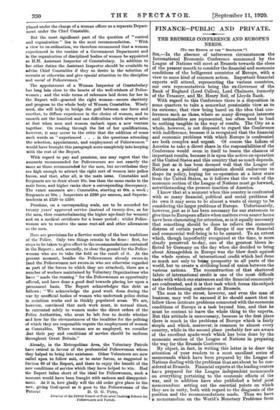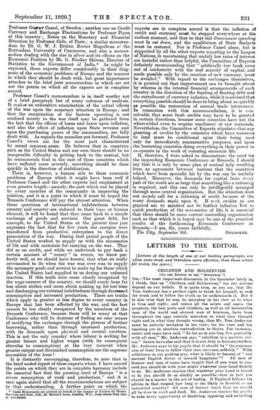FINANCE—PUBLIC AND PRIVATE.
THE BRUSSELS CONFERENCE AND EUROPE'S NEEDS.
Fre THE EDITOR. or THE " SPECTATOR."I Slit,—In the absence of unforeseen circumstances the International Economic Conference summoned by the League of Nations will meet at Brussels towards the close of the present month to consider the financial and economic conditions of the belligerent countries of Europe, with a view to some kind of common action. Important financial experts will attend, representing the various countries, our own representatives being the ex-Governor of the Bank of England (Lord Cullen), Lord Chalmers, formerly of the Treasury, and Mr. Henry Bell, of Lloyds Bank. With regard to this Conference there is a disposition in some quarters to take a somewhat pessimistic view as to its outcome, that view being based on the idea that con- ferences such as these, where so many divergent interests and nationalities are represented, too often tend to lead. to nothing tangible in the way of results. The City as a whole, however, is not disposed to regard the Conference with indifference, because it is recognized that the financial and economic problems with which Europe is confronted are both complex and urgent. Of -course the failure of America to take a direct share in the responsibilities of the Conference would seem in itself to lessen the chances of important results, because it is upon the active co-operation of the United States and this country that so much depends. But just as it has been deemed well that the League of Nations as a political organization should endeavour to shape its policy, hoping for co-operation at a later state from the United States, so it follows that the work of the economic section of the League of Nations must go forward, notwithstanding the present inaction of America. I know that at a moment when this country is confronted with so many financial, political and social problems of its own it may seem to be almost a waste of energy to be considering the larger problems of Europe. Unfortunately, however, just as it has been necessary for our statesmen to give time to European affairs when matters even nearer home have been clamouring for attention, so is it equally necessary that something should be done to relieve the economic distress of certain parts of Europe if our own financial and commercial well-being is to be assured. To an extent which, though imperfectly recognized at the time, is more clearly perceived to-day, one of the greatest blows in- flicted by Germany on the day when she decided to bring about Armageddon in Europe was the blow dealt against the whole system of international credit which had done so much not only to bring prosperity to all parts of the world, but to create a civilising bond of union between the various nations. The reconstruction of that shattered fabric of international credit is one of the most difficult tasks with which our statesmen and the financial community are confronted, and it is that task which forms the subject of the forthcoming conference at Brussels. The man in the street, however, and even the man of business, may well be excused if he should assert that to follow these intricate problems connected with the economic conditions of Europe is a task beyond him, and that he must be content to leave the whole thing to the experts. But this attitude is unnecessary, because in the first place there is much in the problems of Europe which is fairly simple and which, moreover, is common to almost every country, while in the second place probably few are aware of the excellent spade-work which has been done by the economic section of the League of Nations in preparing the way for the Brussels Conference. My object, in fact, in writing this letter is to draw the attention of your readers to a most excellent series of memoranda which have been prepared by the League of Nations dealing with the problems that are about to be con- sidered at Brussels. Financial experts at the leading centres have prepared for the League independent memoranda on everything pertaining to the economic effects of the war, and in addition have also published a brief joint memorandum setting out the essential points on which they are in unity, both with regard to the diagnosis of the position and the recommendations made. Thus we have a memorandum on the World's Monetary Problems from Professor Gustav Cassel, of Sweden ; another one on Credit Currency and Exchange Fluctuations by Professor Pig ou of this country ; Notes on the Monetary and Financial Situation by Professor Gide, of Paris ; a similar memoran- dum by Dr. G. W. J. Bruins, Rector Magnificus of the Rotterdam University of Commerce, and also a memor- andum dealing with the rise in silver and its effects on the Economic Position by Mr. G. Findlay Shirras, Director of Statistics to the Government of India.* As might be expected, these experts differ considerably in their diag- nosis of the economic problems of Europe and the manner in which they should be dealt with, but great importance attaches to the brief joint memorandum in which are set out the points on which all the experts are in complete accord.
Professor Cassel's memorandum is in itself worthy not of a brief paragraph but of many columns of analysis. It makes an exhaustive examination of the actual effects of the war upon the monetary situation in Europe ; and that the examination of the factors operating is not confined merely to the war itself may be gathered from the fact that the effects of loans and taxes upon inflation, and also the effect of inflation upon State revenue and upon the purchasing power of the communities, are fully dealt with. As regards the remedies put forward, Professor Cassel's views are for the most part characterized by sound common sense. He believes that in countries such as the United States and our own there should be no insuperable difficulty in getting back to the normal, but he recommends that in the case of those countries which have suffered more severely, something should be done quickly in the direction of stabilization..
There is, however, a human side to these economic problems of Europe which it might have been well if Professor Cassel and the other experts had emphasized at even greater length—namely, the part which can be played by every member of the community in improving the position, and it is a point to which it must be hoped the Brussels Conference will pay the utmost attention. When these questions of international indebtedness between country and country are reduced to their bare or human element, it will be found that they come back to a simple exchange of goods and services. Our great debt, for example, to the United States at the present time just expresses the fact that for five years our energies were transferred from productive enterprises to the direct prosecution of the war. During that period people of the United States worked to supply us with the necessaries of life and with materials for carrying on the war. They did so on credit, and while we undertook to pay back a certain amount of " money " in return, we knew per- fectly well, or we should have known, that what we really covenanted. to do when the war was over was to supply the necessary goods and services to make up for those which the United States had supplied to us during our enforced inaction. If this truth were more clearly recognized by the wage-earners of the country, we should surely hear far less about strikes and more about making up for lost time and discharging our external indebtedness through decreased consumption and increased production. These are truths which apply in greater or less degree to every country in Europe that has been affected by the war, and the faot cannot be too clearly recognized by the members of the Brussels Conference, because there will be many at that Conference who will be desirous of finding an easy means of rectifying the exchanges through the process of further borrowing, rather than through increased production, with its demands upon physical and mental exertion. This is not the only country where labour is seeking for greater leisure and higher wages (with its consequent stimulus to consumption) at the very moment when greater output and diminished consumption are the supreme necessities of the hour !
It is distinctly encouraging, therefore, to note that in the brief united report of these experts whom I have named the points on which they are in complete harmony include the essential fact that the pressing need of Europe " is a severe resumption of work and production," and it is once again stated that all the recommendations are subject to that understanding. A further point on which the • These Memoranda are printed on behalf of the League of Nations by Messrs. Harrison and Som. Ltd.. St. Martin's Lane. London. W.V.. from whom they may be purchased. experts are in complete accord is that the inflation of credit and currency must be stopped everywhere at the earliest moment, and that to that end Government spending must be cut down, and the equilibrium of State Budgets must be restored. Nor is Professor Cassel alone, but is supported by all the other experts reporting to the League of Nations, in maintaining that unduly low rates of interest are harmful rather than helpful, the Committee of Experts definitely recommending that " artificially low bank rates out of conformity with the real scarcity of capital, and made possible only by the creation of new currency, must be avoided." With regard to the exchanges themselves, it is pointed out that improvement can be brought about by reforms in the internal financial arrangements of each country in the direction of the funding of floating debt and the curtailment of currency inflation, while it is advised that everything possible should be done to bring about as quickly as possible the restoration of normal trade intercourse.
In connexion with this recommendation, it is con- ceivable that some fresh credits may have to be granted in certain directions, because some countries have not the wherewithal even to acquire machinery or raw materials. Nevertheless, the Committee of Experts stipulates that any granting of credits by the countries which have resources to lend must be conditional upon their being used only for immediately remunerative purposes, and upon the borrowing countries doing everything in their power to co-operate in the work of restoring economic life. If, therefore, I were asked to demonstrate the need for the impending Economic Conference at Brussels, I should say that it is only by some plan of mutual help resulting from an agreement between nations that the countries which have been specially hit by the war can be usefully helped. Moreover, the demands for capital from every part of the world are so large that something like a rationing is required, and this can only be intelligently arranged through some central organization. But the situation does not merely call for a rationing of credit because of the many demands made upon it. If such credits as are granted are to minister not to further inflation but to quick production of the necessaries of life, it is essential that there should be some central controlling organization such as that which it is hoped may be one of the practical results of the forthcoming Economic Conference at Brussels.—I am, Sir, yours faithfully,



































 Previous page
Previous page